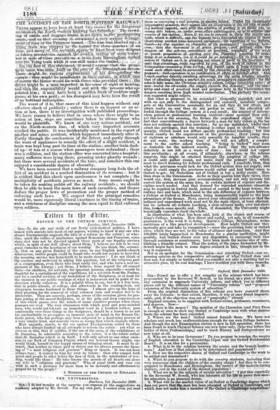Itittrg to 4t (Fittrr.
REFORM OP THE CHORCII SERVICE.
Loudon, 10th December 1850.
Sin—In the stir and strife of our lively ecclesiastical politics, I have looked with anxiety into most of our papers, waiting to ]mow if any one who abuses Tractarianism suggests the idea of a reform in the rubric ; or whe- ther, amid the collies of anathemas against Romanism and Puseyism, some stray shot may not be directed against those parts of our Sunday services which, in spite of our dull silence about them, I believe are felt to be very great obstacles to the heartiness of our worship. Do you think, Sir, serious- ly, that on any given Sunday of the year, in any English parish-church whatsoever, twelve people could be found who would not rejoice to hear that the morning service was henceforth to be made shorter ? I do not think of the careless and undevout in asking this question, but of the religious part of a congregation, even those who least easily tire and who have a real en- joyment of the Liturgy ; yet these, I believe, from regard for all around thorn—for children, for servants, for ignorant persons, especially—would be thankful for a curesilment of the repetitions, for a selection from the Psalms, and for a careful revision of our translation of the Scriptures, or at least for the omission in our public readings of what is indecorous and in point of in- struction wholly valueless. It is a painful thing to say, but it is I fear true, that in public schools, at college, and afterwards in the reading-desk, our clergymen become hardened to these things. I almost give up the hope of their pleading for the removal of what common men and women feel to be intolerable. They are scarcely, perhaps, aware of the occasion given for pro- fane jesting at the sacred Scriptures, or at the pain and deep consciousness of this which passes over the minds of many sensitive persons when those passages are read. The very obtuseness with which good and pure-minded men, who would not tolerate an immodest word in a heathen author, pass contentedly over these things in the Scriptures, should be a lesson to us not too uncharitably to presuppose an immoral state of mind in the Roman Ca- tholic priest, who has perhaps only been subjected to a hardening process of a very similar kind, and scarcely views as wrong that which disgusts others. Most unjustly, surely, is the cry against Tractarianism raised by those who have always hushed up all attempts to reform the rubric : yet what so obvious as this, that if candles, if the use of the cross, if the exhibitions at St. Barnabas, be admissible according to the rubric, it is the rubric rather than St. Barnabas which is in fault. I will only advert to one other omis- sion in our Book of Common Prayer, which our "beloved Queen might, one -would think, herself be the happy means of bringing about. It must be al- lowed, that neither in times past or future can we always possess the bless- ing of " a most religious and gracious" King or Queen. It has not been always true; it cannot be true for over in future : then why compel both priest and people to utter before the face of God, in the solemnities of wor- ship, words like these ? He who. knows the secrets of all hearts can alone say who is " religious and gracious." Who of royal birth and race can wish in such a presence for more than to be devoutly and affectionately prayed for by the people ? A MEMBER OP THE CROWE OF ENGLAND.


























 Previous page
Previous page